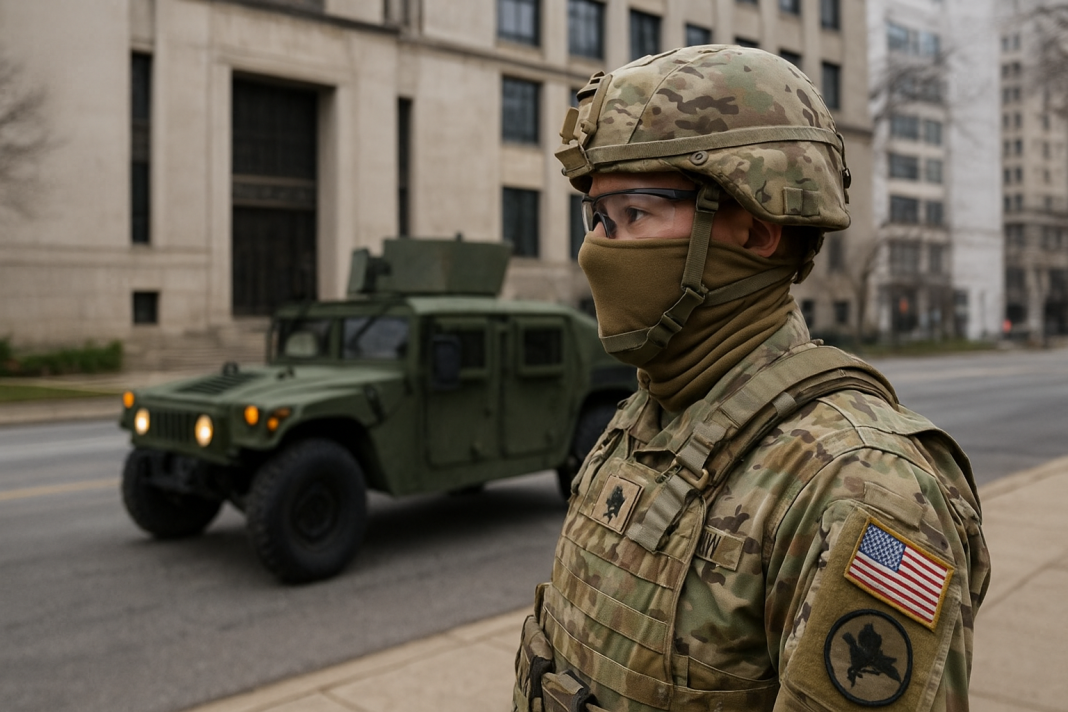A federal judge in Chicago has temporarily stopped U.S. President Donald Trump’s decision to send hundreds of National Guard soldiers to Illinois. The order came on Thursday after more than two hours of courtroom arguments between lawyers representing the U.S. government and the state of Illinois.
Illinois Court Blocks Deployment Amid Rising Tensions
U.S. District Judge April Perry ruled that allowing the Guard deployment would “add fuel to the fire” instead of calming tensions. Her order came just five days after another U.S. judge had blocked a similar deployment in Portland, Oregon. Perry’s ruling means no Guard troops can operate in Illinois until at least October 23.
The state government of Illinois sued the Trump administration. It argued that the president was misusing his authority by sending troops to cities that had not requested federal military help. The court decision marked another major test of presidential powers. It came during a period of civil unrest across the United States.
Armed woman bleeds in hospital after clash — National Guard storms into Chicago unrest
Meanwhile, a federal appeals court in San Francisco appeared ready to lift the earlier block on Trump’s Portland deployment. This move could soon allow hundreds of Guard soldiers to enter that city. Together, these two cases could have significant consequences for Trump’s broader campaign. The campaign involves sending military personnel into American cities governed by Democratic leaders.
Judges Question Government’s Claims of Violence in Illinois
In court, government lawyers said the National Guard was needed to protect federal officers and government buildings from demonstrators. They described the protests near an immigration facility in Broadview, Illinois, as violent.
Judge Perry, however, said she found little evidence to support those claims. She noted that only small groups of protesters had gathered peacefully at the Broadview Immigration and Customs Enforcement (ICE) facility for several weeks. She also pointed out that a separate Chicago judge had just limited the use of force by federal officers against crowds after protesters and journalists accused ICE agents of injuring them.
Legal firestorm erupts as judge says Trump cannot override Governors on National Guard orders
According to Perry, the behavior of ICE officers had actually provoked the protests. Deploying more armed soldiers, she said, would “only add fuel to the fire that defendants themselves have started.” Her written order temporarily bars the federal government from sending any National Guard troops to Illinois.
On Thursday evening, a small number of Guard soldiers were seen standing inside the gates of the ICE center in Broadview, while around ten protesters remained outside. The tense but quiet scene reflected the uneasy balance between local protests and federal authority.
The White House reacted quickly to the judge’s decision. Spokesperson Abigail Jackson said the administration planned to appeal. She stated, “President Trump will not turn a blind eye to the lawlessness plaguing American cities and we expect to be vindicated by a higher court.”
Illinois Governor JB Pritzker welcomed the ruling in a social media post. He wrote, “Donald Trump is not a king — and his administration is not above the law. There is no credible evidence of a rebellion in the state of Illinois. And no place for the National Guard in the streets of American cities like Chicago.”
Legal and Political Battles Spread Across States
Trump’s move to deploy the National Guard has triggered legal and political clashes across several states. In Oregon, state officials also sued to block the federal troops. At an appellate hearing in San Francisco, Oregon Assistant Attorney General Stacy Chaffin argued that Trump’s claims of violent protests were “untethered from reality.”
The three-judge panel appeared divided. Some questioned whether to focus on current peaceful conditions or consider earlier unrest that briefly shut down ICE’s Portland offices. One judge, Ryan Nelson, a Trump appointee, said courts should not make “day-by-day” decisions on troop needs.
Under U.S. law, the National Guard operates under state governors and usually responds to natural disasters, not civilian law enforcement. Legal experts say the president’s power to deploy the Guard without state consent is limited, and Trump’s actions have tested those limits.
Trump has defended his deployments, calling them efforts to fight “left-wing domestic terrorism” and citing Antifa as a threat. He has already sent troops to Washington, D.C., Los Angeles, and Memphis. In Memphis, the state’s Republican governor supported the move, but a Los Angeles court ruled a similar deployment illegal — a decision now under appeal.
At a cabinet meeting, Trump said, “We’re in Memphis. We’re going to Chicago. We’re going to other cities.” The growing dispute underscores sharp divisions between federal and state authorities over protest management. For now, the Illinois court’s ruling remains a key barrier to Trump’s broader use of the National Guard in American cities.

